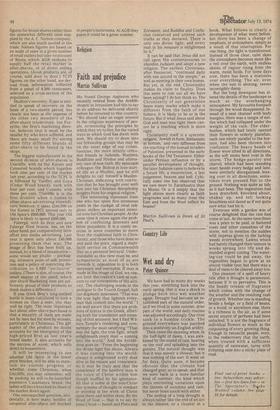Country Life
Wet and dry
Peter Quince
We have had so many dry weeks this year, stretching back into the early spring, that it was a shock to plunge back into wet weather again. Drought had become an established part of the natural order, as if we lived in some sunnier, drier part of the world, and daily routine was adjusted accordingly. Our river sank to a humble trickle. The ground everywhere was parched into a positively un-English aridity.
Then came the morning when, in the half-light of dawn, I was awakened by the sound of rain, beating on the roof and splashing into the gutters. The natural thought was that it was merely a shower; but it was nothing of the sort. It went on , for days. Quite soon, it became obvious that the climate had changed gear, so to speak, and that we were back in a more familiar kind of summer, the kind which plays interesting variations upon the themes of sunshine and rain, but never loses touch with either.
The ending of a long drought is always rather like the end of an act in the theatre, or a chapter in a book. What follows is clearly a development of what went, before, but there has been a change of emphasis, or atmosphere, simply as a result of that interruption. For one thing, the light is transformed. Instead of those clear, calm skies the atmosphere becomes more like a veil over the earth, with endless skeins of vapour rising from the warm, moist fields. For some days now, there has been a mistiness over everything. The air, even when the sun is shining, seems incorrigibly damp. But the long downpour has altered the details of the landscape as much as the overhanging atmosphere. My favourite footpath through the wood disappeared. Instead of a neat channel with leafy margins, there was a tangle of nettles which had collapsed under the weight of the rain. The elderbushes, which had lately opened their flowers in orderly platefuls, each one nicely parallel to the horizon, had also been thrown into confusion. The heavy heads of flower were tilted in all directions, as the soft stems bent over in the storm. The hedge-parsley and chervil, which had been standing erect beside every hedge and lane, were similarly disorganised, leaning over in all directions, sometimes even pressed flat to the ground. Nothing was quite as tidy as it had been. The vegetation had been drenched, knocked about, shaken up, and left looking breathless and dazed as if not quite sure what had hit it.
Everyone with a garden was of course delighted that the rain had come at last. At the'same time there was a price to be paid, in battered ' roses and other casualties of the storm, not to mention the sudden wild impetus given to the lurking weeds everywhere. Lawns which had barely changed their texture in weeks sprang into life and demanded urgent cutting. The watering-can could be put away, the vegetables began to grow at an almost visible rate; but there was a deal of mess to be cleared away too.
One pleasure of a spell of heavy rain after a drought is paramount, because it is so pervasive. This is the heady release of fragrance which comes with the change of the weather and the resulting rush of growth. Whether one is standing beside a hedge, or a field of beans, or a wood, or anywhere else, there is a richness in the air, as if some secret source of perfume had been unlocked. It is not the fragrance of individual flowers so much as the outpouring of every growing thing. Enough to reconcile people, even, to the, rediscovery that the earth, when treated with a sufficient quantity of rainwater, turns with irritating ease into a sticky plain of mud.


































 Previous page
Previous page